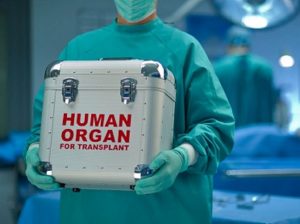The Volokh Conspiracy
Mostly law professors | Sometimes contrarian | Often libertarian | Always independent
How to End America's Kidney Shortage
Two leading experts explain how legalizing organ markets can fix the problem, thereby saving tens of thousands of lives each year, and greatly reducing the suffering of patients on the kidney waiting list.

In a recent article in Regulation, economist Frank McCormick and Stanford Medical School Professor explain how the United States could put an end to our persistent shortage of kidneys for transplant:
News stories abound of kind people—relatives, close friends, and even complete strangers—who donate a kidney to someone suffering from kidney failure. These stories usually explain that people whose kidneys have failed must either obtain a transplant, which enables them to live 10–20 years in reasonably good health, or suffer on dialysis for an average of four to five years as their health steadily deteriorates until they die.
Sometimes these stories explain that many kidney failure patients never receive the optimal treatment of a transplant because there is a drastic shortage of transplant kidneys. About 125,000 patients are diagnosed with kidney failure each year, but only about 22,000 receive a transplant. In a 2022 Value in Health article, we estimate that more than 40,000 additional kidney failure patients would be saved from premature death each year if they received kidney transplants….
Few if any of these news stories lamenting the kidney shortage or touting high‐tech breakthroughs mention that we already have a solution to the shortage: compensating kidney donors to induce more supply. Frustratingly, the U.S. government is obstructing this solution.
NOTA is the problem / Virtually all economists who have studied the issue believe the basic cause of the kidney shortage is a provision in the 1984 National Organ Transplant Act (NOTA): "It shall be unlawful for any person to knowingly acquire, receive, or otherwise transfer any human organ for valuable consideration for use in human transplantation if the transfer affects interstate commerce."
This sentence seems innocuous, but it imposes a price ceiling of near‐zero on the market for kidneys. Both economic theory and abundant evidence have shown that whenever the government holds the price of a good below the market‐clearing price, it causes a shortage of that good. Moreover, if the government holds the price far below the market‐clearing price (our 2022 article estimates that price would be about $80,000 per kidney), then the shortage will be huge: more than 40,000 kidneys per year in the United States alone. For context, that is more deaths than from motor vehicle crashes each year.
It's worth adding that, in addition to saving numerous lives, organ markets would also save thousands of people from the enormous pain and expense of spending years on kidney dialysis. That's a huge burden even for those fortunate enough to eventually get a transplant.
It's important to recognize that legalizing kidney markets would not, of course, require individual patients to personally purchase kidneys at some kind of store or auction. Rather, they would be bought by health care providers, just as other complex medical supplies currently are. They would have strong incentives to assure quality and safety (as is currently true with unpaid donations). Indeed, the option of payment can actually improve quality, by eliminating shortages that may currently lead to pressure for lower standards. Medical insurance providers would have strong incentives to cover the cost of organs, because - among other things - it's a lot cheaper than paying for the alternative of kidney dialysis (as public and private insurance plans currently do in most cases).
While economists across the political spectrum believe that organ markets are the obvious solution to the kidney transplant shortage, McCormick and Held lament (quoting Steve Levitt) that "virtually every non‐economist thinks it is crazy."
It's certainly true that non-economists are far more hostile to organ markets than economists are. But Levitt's assessment is overly pessimistic. In a 2019 American Economic Review article, Julio J. Elías, Nicola Lacetera, and Mario Macis used sophisticated surveys and experiments to show that about half the public is open to supporting kidney sales, a figure that rises to 70% if they believe that markets would end the kidney shortage completely.
I think this study may overstate the amount of support a real-world organ market proposal would enjoy, as it's difficult to model the "yuck factor" fully in an experimental setting. Imagine, for example, the kinds of TV ads that opponents could run ("greedy corporations want to sell off your body parts, one by one"; "rich people will buy up all the kidneys!"). Moreover, real-world rationally ignorant voters often don't know basic economics and therefore don't realize that markets clear up shortages. But the AER study does strongly suggest there is more potential support out there for organ markets than many suppose.
In the meantime, McCormick and Held outline a number of moderate increases in donor compensation that they think are more politically feasible than full-blown legalization of markets. They largely have to do with compensating donors for various expenses they incur. All of these ideas seem worth pursuing. But I am skeptical they will achieve anywhere near as much as full-blown markets would. As always, however, the best should not be the enemy of the good.
In previous writings, I have criticized standard arguments against organ market legalization, such as concerns that it would be too dangerous for organ donors, claims that it amounts to to immoral "commodification" of the body, and fears that it would lead to exploitation of the poor (see also here). Even if these or other objections have more validity than I give them credit for, to justify banning organ markets they have to be significant enough to outweigh the savings of tens of thousands of lives each year, plus the alleviation of enormous suffering by people otherwise condemned to kidney dialysis.


Show Comments (41)